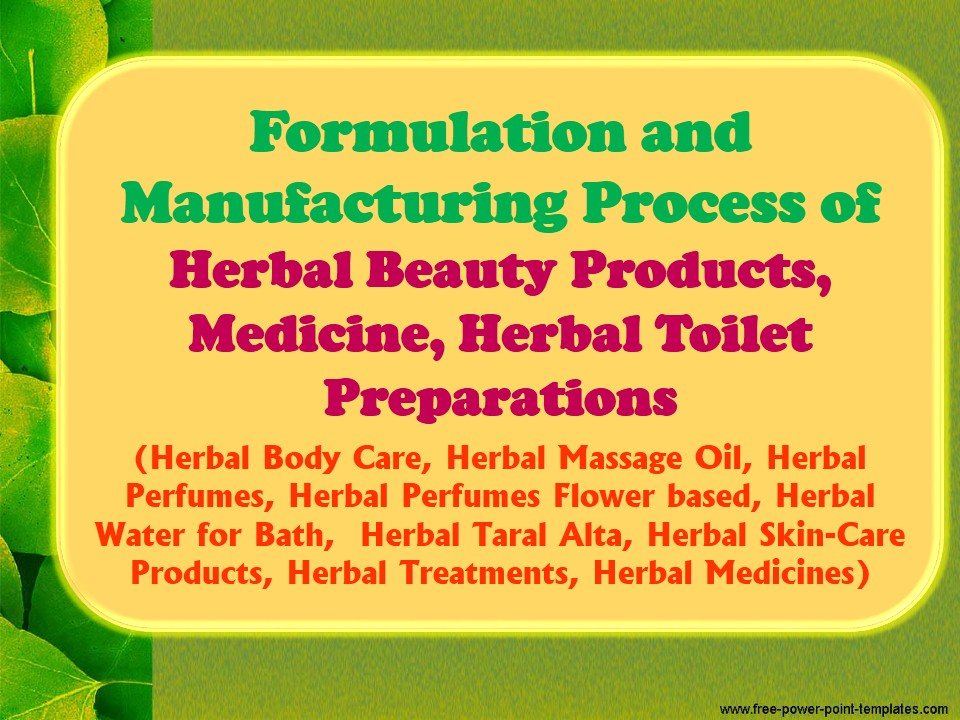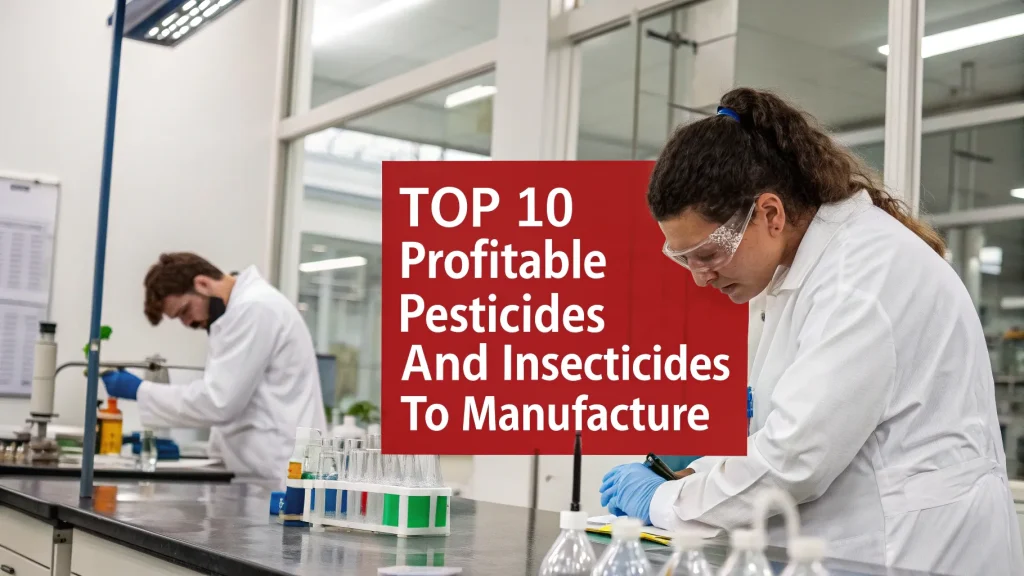
Herbal products have gained immense popularity as people increasingly shift toward natural remedies and chemical-free personal care solutions. Entrepreneurs now have significant opportunities in developing and producing herbal-based cosmetics, toiletries, and health aids. These products use extracts from plants, flowers, roots, and essential oils to offer therapeutic and beautifying effects. With rising global demand and growing awareness of wellness, starting a business based on the formulation and manufacturing process of herbal beauty products medicine herbal toilet preparations herbal body care herbal massage oil herbal perfumes herbal perfumes flower based herbal water offers both profitability and sustainability. Moreover, proper knowledge of ingredients, formulations, and production techniques ensures consistent quality and market acceptability.
See Also – Ultrapure Silicon from Rice Husk Ash
Formulation and Production of Herbal Products
To manufacture herbal products efficiently, it is essential to understand the formulation, active ingredients, extraction methods, and quality control protocols. Many herbal preparations include combinations of oils, powders, pastes, and extracts sourced from flowers, roots, leaves, and seeds. Additionally, attention to shelf life, consistency, and packaging enhances the commercial viability of each product category.
Herbal Beauty Products
Herbal beauty products include creams, scrubs, lotions, face packs, and serums made using natural ingredients like aloe vera, turmeric, neem, rose, and sandalwood. Manufacturers prepare these products by blending water- or oil-based herbal extracts with suitable emulsifiers, thickeners, and natural preservatives. For instance, an herbal fairness cream may include turmeric extract, saffron oil, almond oil, beeswax, and essential oils for fragrance. In contrast, exfoliating face scrubs use walnut shell powder or apricot kernel powder as natural abrasives.
Moreover, producers must maintain skin pH, ensure allergen-free compositions, and adhere to regulatory standards. As a result, high-quality herbal cosmetics offer effective alternatives to chemical-based beauty products while meeting rising consumer expectations for skin safety and eco-friendliness.
Herbal Medicine Preparations
Herbal medicine formulations are rooted in Ayurvedic, Siddha, and Unani traditions. These preparations include tablets, syrups, powders, pastes, and decoctions made from medicinal plants. Common herbs include ashwagandha, tulsi, giloy, brahmi, and shankhpushpi. The manufacturing process begins with the selection of dried raw herbs, followed by washing, pulverizing, and boiling them to extract active compounds. This extract is then concentrated and blended with carriers like honey, ghee, or jaggery to prepare final products.
To ensure therapeutic efficacy, herbal medicine manufacturers must follow Good Manufacturing Practices (GMP), conduct microbial and phytochemical testing, and ensure proper labeling. In addition, well-researched formulations that balance traditional knowledge with scientific validation appeal to both domestic and international markets.
Herbal Toilet Preparations
Herbal toilet preparations encompass a wide range of personal care items such as herbal soaps, tooth powders, shampoos, deodorants, and intimate washes. For example, herbal soaps may use coconut oil, castor oil, neem oil, and essential oils like lavender or lemongrass. Cold or hot process soap-making techniques allow these ingredients to retain their natural benefits.
Similarly, herbal shampoos feature mild surfactants blended with extracts from shikakai, amla, reetha, and hibiscus. These are then stabilized with thickeners and preservatives derived from natural sources. In contrast, herbal toothpaste and tooth powders rely on clove, babool, rock salt, and miswak for oral hygiene. As a result, these preparations fulfill daily hygiene needs without the harsh side effects of synthetic chemicals.
Herbal Body Care Products
Herbal body care items include moisturizers, bath oils, scrubs, and talcum powders. These products typically focus on nourishing the skin, improving tone, and providing hydration. For instance, body lotions can contain aloe vera gel, almond oil, shea butter, and vitamin E, blended with rose or lavender essential oils.
Manufacturers use homogenization techniques to mix the oil and water phases uniformly, ensuring consistency in texture and performance. Body scrubs may incorporate natural exfoliants like oatmeal, rice bran, or sugar crystals with essential oils for a refreshing experience. Moreover, many formulations now avoid parabens, sulfates, and synthetic fragrances to meet clean-label demands. With increasing interest in natural self-care routines, these herbal body care products offer a compelling market proposition.
Herbal Massage Oils
Herbal massage oils form a crucial part of therapeutic and wellness regimens. These oils are typically made by infusing carrier oils such as sesame, olive, mustard, or coconut oil with medicinal herbs. For example, a pain relief oil may include herbs like camphor, eucalyptus, ashwagandha, or nirgundi. The infusion process involves slow heating of herbs in base oils for several hours to allow the active compounds to blend effectively.
To manufacture these oils commercially, stainless steel jacketed vessels with temperature controls help maintain quality and prevent degradation of volatile oils. Moreover, packaging in dark-colored glass bottles helps preserve potency. These oils are widely used in spas, Ayurvedic massage centers, and wellness clinics for their therapeutic properties. Their growing demand supports the expansion of the formulation and manufacturing process of herbal beauty products medicine herbal toilet preparations herbal body care herbal massage oil herbal perfumes herbal perfumes flower based herbal water across various industry segments.
Herbal Perfumes and Fragrances
Herbal perfumes are created using essential oils, hydrosols, and floral extracts instead of synthetic aroma chemicals. These perfumes come in oil-based or alcohol-free spray formats and are suitable for sensitive skin. Commonly used flowers and herbs include rose, jasmine, kewra, sandalwood, patchouli, and vetiver. To produce these perfumes, manufacturers either distill fresh plant materials or use solvent extraction to obtain high-purity fragrance compounds.
After extraction, the essential oils are blended in precise ratios to achieve desired top, middle, and base notes. Fixatives like benzoin or frankincense ensure longevity of fragrance. Moreover, many manufacturers design floral blends that suit different moods, seasons, or Ayurvedic body types. As a result, herbal perfumes not only offer a pleasant scent but also align with natural healing traditions.
Flower-Based Herbal Water
Flower-based herbal waters, also known as hydrosols, are produced through steam distillation of flowers like rose, lavender, marigold, and jasmine. These waters retain trace amounts of essential oils and are widely used in facial mists, toners, hair sprays, and aftershaves. The formulation is typically simple, with distilled flower water as the base, occasionally enhanced with glycerin or other humectants.
To ensure purity and freshness, production must involve hygienic collection of fresh blossoms, gentle distillation using stainless steel units, and storage in sterilized containers. Because these waters are prone to microbial contamination, many producers add mild natural preservatives or use ultraviolet sterilization techniques. Flower-based herbal water offers a cooling, soothing, and aromatic experience, making it an integral part of the growing demand for natural skin and hair care solutions.
Packaging, Quality Control, and Compliance
Packaging plays a crucial role in maintaining the stability and appeal of herbal products. Use of eco-friendly, recyclable, or biodegradable materials not only protects the product but also enhances brand value among conscious consumers. Bottles, jars, tubes, and pouches must be airtight, light-resistant, and compatible with the formulation.
Quality control involves monitoring raw material purity, pH balance, microbial contamination, and product consistency. Testing includes organoleptic evaluations, stability tests, and compliance with cosmetic safety regulations. Additionally, herbal product businesses must register under drug and cosmetics regulations or AYUSH licensing as per Indian standards. Export-oriented units should also follow GMP, ISO, or USDA organic certifications to meet global compliance norms.
By maintaining quality, adhering to regulatory standards, and focusing on clean label claims, manufacturers build consumer trust. This strengthens the overall ecosystem supporting the formulation and manufacturing process of herbal beauty products medicine herbal toilet preparations herbal body care herbal massage oil herbal perfumes herbal perfumes flower based herbal water.
Market Potential and Entrepreneurial Opportunities
The global herbal products market is witnessing exponential growth driven by demand for clean beauty, wellness, and traditional remedies. Entrepreneurs can tap into this momentum by launching herbal cosmetics brands, Ayurvedic therapy lines, or organic wellness kits. The low entry barrier for small-scale units, availability of locally sourced herbs, and support from government schemes further encourage new entrants.
Moreover, strategic use of e-commerce platforms, influencer marketing, and sustainable packaging can expand reach and brand recall. Businesses that combine formulation expertise with smart branding stand to capture significant market share. As a result, this sector offers profitable ventures aligned with long-term consumer health and environmental sustainability.
See Also – Solar PV Module Manufacturing
Conclusion
The formulation and manufacturing process of herbal beauty products medicine herbal toilet preparations herbal body care herbal massage oil herbal perfumes herbal perfumes flower based herbal water represents a growing field of innovation and wellness. From sourcing authentic herbs to crafting eco-friendly formulations, the opportunities are vast for entrepreneurs dedicated to natural care. With a strong focus on quality, regulatory compliance, and consumer preferences, businesses can thrive in this sector while promoting sustainable and healthy lifestyles.





